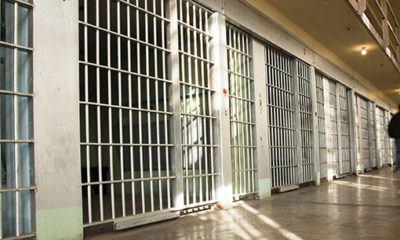Published
7 years agoon
By
AP News
SACRAMENTO — California would be the first state to completely end bail for defendants awaiting trial under a proposal unveiled Thursday that would create a new system to instead jail people based on their risk level.
The bail industry has argued that eliminating cash bail would take away an essential tool in ensuring defendants show up in court.
The American Civil Liberties Union of California was previously a co-sponsor of the legislation, but took a neutral position because of amendments to the bill. It supports the idea of eliminating bail but wants the bill to include study of the changes to identify racial bias and include stronger protections to ensure due process, said Natasha Minsker, director of the ACLU’s California Center for Advocacy and Policy.
The amended bill passed out of an Assembly committee Thursday and now heads to the Assembly floor. It needs approval from both houses of the Legislature and a signature from the governor to become law. Assembly Speaker Anthony Rendon and Senate President Pro Tem Toni Atkins have both identified bail reform as a top priority.
The proposal will likely cost hundreds of millions of dollars each year to fund new jobs in the judiciary to conduct the risk assessment process, Hertzberg said. Lawmakers are slated to consider a $15 million appropriation this year to train people ahead of implementation.
Under SB10, suspects would be categorized as having high, medium or low risk of failing to appear in court, endangering public safety or committing a new crime. The determination would be based on the charges, criminal record, missed court appearances in the past three years, and other factors.
Additionally, prosecutors would be required to ask victims whether a suspect should be detained, which would also be considered.
Low risk people would generally be released before trial, although they may be subject to some nonmonetary conditions to ensure public safety and their return to court. The Judicial Council, a rulemaking organization run by the chief justice, will determine what options courts have when setting pretrial release conditions.
Local courts would have broad discretion over whether to release people deemed a medium risk.
Officials would need to decide whether someone deemed a low or medium risk should be released before trial within 24 hours after the person is booked with a potential 12-hour extension.
High risk suspects would not be eligible for pretrial release. Some drug and alcohol charges, restraining order violations, past violations of pretrial release conditions and other factors could also make someone ineligible for pretrial release.


California Pins Vaccine Hopes on Biden Administration


Walters: After COVID-19, Drought Threat Still Looms


Fierce California Winds Fan Fires, Topple Trees and Trucks


Monarch Butterfly Population Moves Closer to Extinction


Newsom Sets New Tone for California, White House Partnership


California Guard Pleads Guilty to Lies in Inmate’s Death




